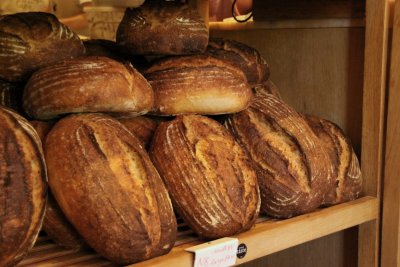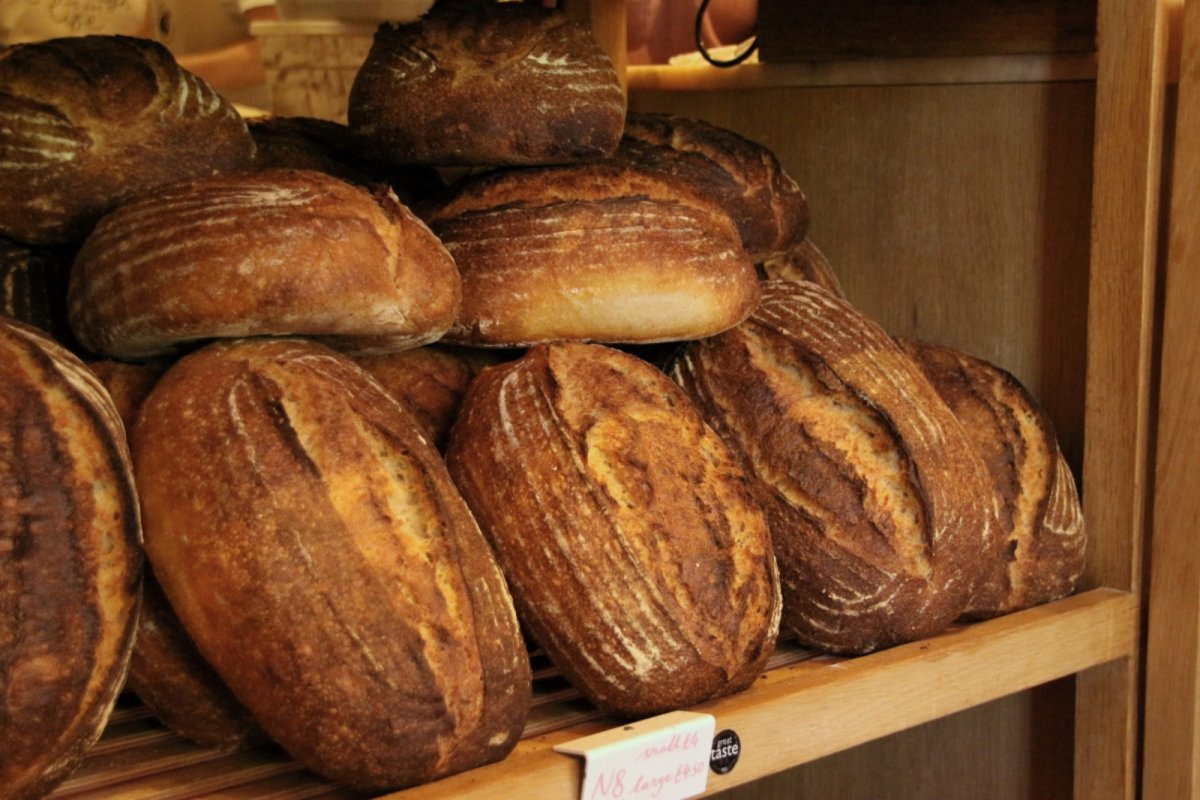 N8 loaves at Sourdough Sophia, Crouch End. Credit: CC-BY-SA-4.0 Chris Young / www.realbreadcampaign.org
N8 loaves at Sourdough Sophia, Crouch End. Credit: CC-BY-SA-4.0 Chris Young / www.realbreadcampaign.org
Be your local baker
Real Bread Campaign coordinator Chris Young shares some top tips from the unique microbakery handbook, Knead to Know…more.
Do you love making Real Bread? Ever thought that people would be happy to pay for your lovingly-crated creations but you don’t know where to start as a budding bready businessperson?
What’s a microbakery?
That depends on who you’re asking. When people in Real Bread Campaign circles talk about a microbaker, they usually mean a sole trader who cranks up the oven in their home kitchen oven to make at most a few dozen loaves each weekend, or as often as the local farmers’ market runs. There are variations, such as roping in a family member, friend or three; using a garage, or small commercial space; getting a ‘semi-pro’ oven and baking hundreds of loaves. Some operate full-time and even take on staff – official guidance is that a microbusiness might employ up to ten people.
Pages of history
Back in 2010, I began harvesting information and advice from small bakery business owners in the Real Bread Campaign’s network. By the time I’d finished pulling everything together, I felt all that hard-earned knowledge deserved a wider audience. In January 2011, we published Knead to Know as a book. A year later, we’d sold 1000 copies.
A decade on, the microbakers in our network had multiplied and amassed much more experience, some of which I gathered to produce Knead to Know…more, a book around twice as long as the original. Following a crowdfunding campaign, raising £12,000, we were able to publish the new edition in November 2021.
Turning your baking hobby into a business
Where do you start? Well, the general gist I got from the many bakers was the first thing to do is get really good at making Real Bread. Take classes, read books, watch videos and practice. Lots. It doesn’t have to be fancy – a sandwich tin loaf, flatbreads or whatever you love. Once you’ve nailed that, key things to do include:
- Decide where to bake: It might well be in your kitchen, but options could include a garage or out of hours at an eatery.
- Market research: What do people want to buy and how much are they prepared to pay?
- Business planning: Will you be a sole trader or form a partnership or cooperative? Do you want to set up a social enterprise? Is this going to become full time or stay a side hustle?
- Do it right: Register with your local authority, take out appropriate insurance, pay taxes, follow food safety guidelines, check your responsibilities for weights, labelling and other trading standards.
- Costing and pricing: It’s a balance between what you need to cover all of your costs (including your time), the profit you want to make and how much people are prepared to pay. If affordability/accessibility is important to you, how do you build this in?
- Decide on outlets: Kitchen door sales (often based around online pre-orders) are common, as are farmers’ market stalls.
- Be realistic: Don’t try to do umpteen types of bread from day one and take on more customers than you have capacity for. Start small and simple, then build gradually.
Knead to Know…more goes into detail about all of this and more.
Who knows, you could be the next Jackie McKinson, who started making cakes at home and now owns Aries Bakehouse in Brixton. Or perhaps you’re another Sourdough Sophia, the Knead to Know reader who within a year went from hobbyist, to homebased microbaker, to crowdfunding her high street bakery in Crouch End – all since the start of the pandemic!
You can buy Knead to Know…more and the recipe book Slow Dough: Real Bread, as well as join the Real Bread Campaign here
Enjoy Sourdough September and the power of sour at an event near you
London Food Link: London Food Link brings together community food enterprises and projects that are working to make good food accessible to everyone in London to help create a healthy, sustainable and ethical food system for all.
Sustain
The Green House
244-254 Cambridge Heath Road
London E2 9DA
020 3559 6777
sustain@sustainweb.org
Sustain advocates food and agriculture policies and practices that enhance the health and welfare of people and animals, improve the working and living environment, promote equity and enrich society and culture.
© Sustain 2024
Registered charity (no. 1018643)
Data privacy & cookies
Icons by Icons8
